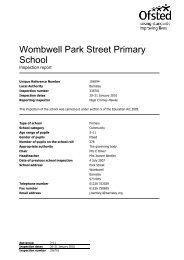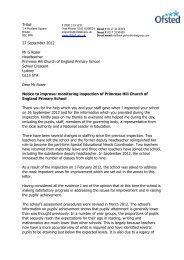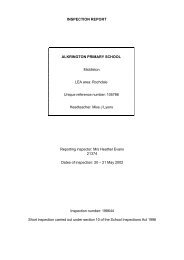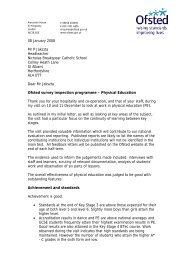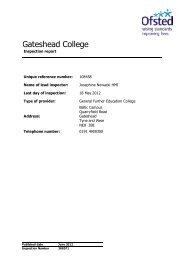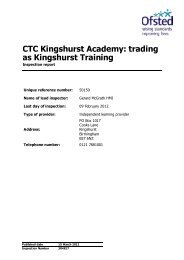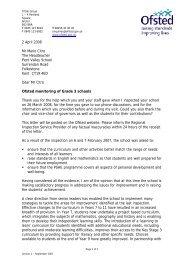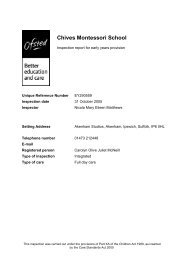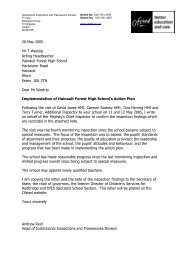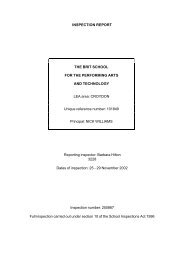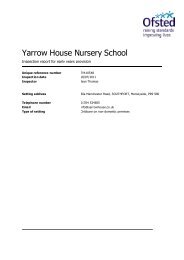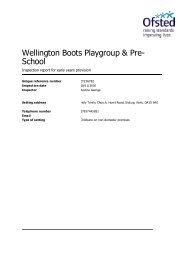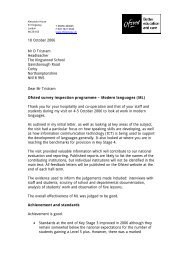24 February 2010 Dr Ian Johnson The Headteacher Brune ... - Ofsted
24 February 2010 Dr Ian Johnson The Headteacher Brune ... - Ofsted
24 February 2010 Dr Ian Johnson The Headteacher Brune ... - Ofsted
You also want an ePaper? Increase the reach of your titles
YUMPU automatically turns print PDFs into web optimized ePapers that Google loves.
Tribal Group<br />
1-4 Portland<br />
Square<br />
Bristol<br />
BS2 8RR<br />
<strong>24</strong> <strong>February</strong> <strong>2010</strong><br />
<strong>Dr</strong> <strong>Ian</strong> <strong>Johnson</strong><br />
<strong>The</strong> <strong>Headteacher</strong><br />
<strong>Brune</strong> Park Community College<br />
Military Road<br />
Gosport<br />
Hampshire<br />
PO12 3BU<br />
Dear <strong>Dr</strong> <strong>Johnson</strong><br />
T 08456 40 40 40<br />
enquiries@ofsted.gov.uk<br />
www.ofsted.gov.uk<br />
<strong>Ofsted</strong> monitoring of Grade 3 schools<br />
Direct T 0845 123 6001<br />
Direct F 0845 123 6002<br />
enquiries@ofsted.gov.uk<br />
Thank you for the help which you and your staff gave when I inspected your college<br />
with Dee Wheatley and George Rayner, additional inspectors, on 11 <strong>February</strong> <strong>2010</strong>,<br />
and for the information which you provided before and during my visit. I would be<br />
grateful if you would also pass on my thanks to the students and both teaching and<br />
non-teaching staff who gave up their time to talk to us.<br />
Since the last inspection, responsibilities for the senior team have been reorganised.<br />
<strong>The</strong> college is in the process of restructuring pastoral arrangements from a year to a<br />
house system and the new system should be fully embedded by September <strong>2010</strong>.<br />
Three advanced skills teachers have been appointed in performing arts, English and<br />
mathematics. <strong>The</strong>re has been extensive refurbishment of technology areas and<br />
physical education facilities.<br />
<strong>The</strong> college is part of the Gaining Ground initiative and the Extra Mile project. It was<br />
redesignated as a performing arts college in 2008.<br />
As a result of the inspection on 26 and 27 March 2008, the college was asked to:<br />
� improve the consistency of teaching to the level of the best so that students<br />
make better progress, behaviour is improved in lessons and standards rise at<br />
both key stages<br />
� improve attendance by ensuring recent initiatives to reduce absence become<br />
well established<br />
� ensure marking gives students better information about how to improve.<br />
Having considered all the evidence, I am of the opinion that at this time the school<br />
has made inadequate progress in making improvements and inadequate progress in<br />
demonstrating a better capacity for sustained improvement.<br />
Page 1
Since the last inspection, the proportion of students achieving five A* to C grades<br />
both with and without English and mathematics has risen, but is still significantly<br />
below average. <strong>The</strong> rise is largely a result of substantial improvements to the<br />
proportion of students gaining A* to C grades in English and to a lesser extent in<br />
mathematics. Standards in dance remain high and the satisfactory achievement in<br />
other specialist subjects and vocational courses has been maintained. However,<br />
attainment in a range of other subjects remains low, and the improvements seen are<br />
largely limited to more able students. Both examination results and inspectors’<br />
lesson observations show that middle and lower ability students, and especially<br />
those with less serious special educational needs, make inadequate progress<br />
because teaching does not focus sufficiently on meeting their needs and teachers’<br />
expectations are too low.<br />
Too much teaching across the college is still satisfactory with only a small proportion<br />
of outstanding lessons and some that are inadequate. In English and performing arts<br />
teaching is consistently good or better, and this is reflected in the progress the<br />
students make and the standards they reach. A recent focus on coaching teachers,<br />
so they set clear learning objectives and are able to use data, grade and level<br />
criteria and targets to support students, has had a limited impact. Sometimes<br />
however, the focus on targets and levels and how to reach them leads teachers to<br />
teach so tightly to the test that they overlook the key task of generating students’<br />
enthusiasm and excitement for learning. Students described their enjoyment of<br />
project-based subjects where they have a choice about what they do and learn well,<br />
for example in vocational subjects, performing arts, design technology and physical<br />
education. In these lessons they can be active and take responsibility for their own<br />
learning. However, in too many lessons, teachers talk for too long and opportunities<br />
are missed for independent learning, which leads to a lack of engagement. For<br />
example in languages, students are not given enough time to talk to one another<br />
and to develop oral skills. Students are not generally disruptive but they are often<br />
passive, and teachers’ questioning is not sufficiently targeted or probing so<br />
sometimes a few vocal students can dominate the lesson.<br />
<strong>The</strong> college currently has no teaching and learning policy and so expectations for<br />
staff are not explicit. A programme of lesson observation is in place, but the current<br />
proforma is very focused on the actions of the teacher, rather than the quality of<br />
learning for both individual students and groups. It is not clear for example, that<br />
teachers need to use assessment data to differentiate work to ensure that it is<br />
matched to individual students’ needs. Students are not given personalised subjectspecific<br />
targets, especially those with less serious special educational needs. If<br />
strategies are available to help support these students they are often too general to<br />
really help them tackle weaknesses and improve.<br />
Students describe examples of good marking and feedback in English and in projectbased<br />
subjects such as dance, drama, and design technology. Although there have<br />
been some improvements, in many lessons marking is not either regular or formative<br />
enough for students to really feel that their work is valued by teachers, so they take<br />
Page 2
little pride in it. Much work is left unfinished, especially by lower ability students, and<br />
students are not routinely expected and given time to respond to teachers’<br />
comments. <strong>The</strong> marking policy does not model the characteristics of good practice,<br />
nor does it explain clearly how high quality marking and feedback can have a<br />
positive impact on students’ motivation and progress.<br />
Inspectors found students articulate, friendly and happy to engage in conversation.<br />
<strong>The</strong>y are generally more engaged in learning than they were at the time of the last<br />
inspection. Students say that behaviour is better in lessons and that when there are<br />
problems they are generally dealt with effectively by teachers. Exclusion rates have<br />
also fallen. During the visit, good examples were seen to demonstrate students’<br />
spiritual, moral and social development, for example in a Year 8 assembly. Students<br />
are very positive about the impact of the school’s specialist status on provision at the<br />
college, and high numbers are involved both in Key Stage 4 options and in extracurricular<br />
activities linked to dance and drama. <strong>The</strong> influence of the success of the<br />
specialist subjects is not seen in other subjects.<br />
Students’ attendance has improved and in the autumn term came close to the<br />
national average. <strong>The</strong> proportion of persistent absentees has also reduced<br />
substantially this year. Systems are not yet as rigorous as they could be, but the<br />
appointment of a new welfare officer to support the college’s work in encouraging<br />
better engagement with education is already beginning to have a positive impact.<br />
<strong>The</strong> local authority has provided satisfactory support in order to help improve both<br />
behaviour and attendance.<br />
<strong>The</strong> pace of change since the last inspection has not been fast enough and<br />
improvements are too fragile and inconsistent across the college to demonstrate an<br />
impact on students’ achievement, which is currently inadequate. Some plans are in<br />
place, for example to improve provision for students with less serious special<br />
educational needs, but these have yet to make a difference. <strong>The</strong> college leadership<br />
needs to use the expertise of the recently appointed advanced skills teachers to plan<br />
much sharper and more targeted strategies which will to guide and encourage<br />
teachers to improve the quality of their teaching and marking. This will ensure that<br />
students are helped to make the maximum progress. Currently, monitoring of<br />
teachers’ planning, marking and teaching is not sufficiently robust to drive and<br />
embed change which will improve students’ outcomes. Planning does not show the<br />
necessary urgency or focus to tackle embedded weakness in provision quickly. <strong>The</strong><br />
college is therefore making inadequate progress in demonstrating a better capacity<br />
for sustained improvement.<br />
I hope that you have found the visit helpful in promoting improvement in your<br />
school. This letter will be posted on the <strong>Ofsted</strong> website.<br />
Yours sincerely<br />
Mary Massey<br />
Her Majesty’s Inspector<br />
Page 3



